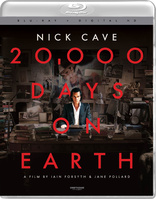20,000 Days on Earth Blu-ray Movie
Home20,000 Days on Earth Blu-ray Movie 
Blu-ray + Digital CopyDrafthouse Films | 2014 | 97 min | Not rated | Nov 18, 2014
Movie rating
7.7 | / 10 |
Blu-ray rating
| Users | 0.0 | |
| Reviewer | 4.0 | |
| Overall | 4.0 |
Overview
20,000 Days on Earth (2014)
Nick Cave is among the most enigmatic figures in music and film. This hybrid drama/documentary features Cave as both subject and co-conspirator, exploring the history of his career and combining it with a staged depiction of how he spends his 20,000th day on Earth.
Starring: Nick Cave, Susie Cave, Warren Ellis (I), Darian Leader, Ray WinstoneDirector: Iain Forsyth, Jane Pollard
| Drama | Uncertain |
| Documentary | Uncertain |
| Music | Uncertain |
Specifications
Video
Video codec: MPEG-4 AVC
Video resolution: 1080p
Aspect ratio: 2.40:1
Original aspect ratio: 2.39:1
Audio
English: DTS-HD Master Audio 5.1 (48kHz, 24-bit)
Subtitles
English SDH
Discs
50GB Blu-ray Disc
Single disc (1 BD)
Digital copy (as download)
Playback
Region A (B, C untested)
Review
Rating summary
| Movie | 4.0 | |
| Video | 5.0 | |
| Audio | 4.0 | |
| Extras | 2.5 | |
| Overall | 4.0 |
20,000 Days on Earth Blu-ray Movie Review
A Portrait of the Artist from the Inside Looking Out
Reviewed by Michael Reuben November 26, 2014Nick Cave has been producing music since the Eighties, both with his bands The Birthday Party and the Bad Seeds and as a soloist and composer of film scores for such works as The Assassination of Jesse James by the Coward Robert Ford, in which he also appeared, The Proposition, for which he wrote the screenplay, and The Road. Another of Cave's screenplays became the film Lawless, and Cave has also written novels, plays, poems and essays. It was probably inevitable that such a restlessly protean talent would end up becoming the subject of his own film, but what kind of film would suit the subject? When Cave invited visual artists Iain Forsyth and Jane Pollard to shoot behind-the-scenes footage of Cave and the Bad Seeds recording the album that would become Push the Sky Away, it was clear from his choice of directors that he wasn't interested in a traditional documentary. Forsyth and Pollard were not narrative filmmakers. Their experience was in making museum installations capturing specific moments, the kind of thing that patrons stop, experience and then leave, dazzled, provoked or maybe just puzzled. The film they eventually produced has a script credited to Cave, Forsyth and Pollard and arrives in disguise as a chronicle of Cave's 20,000th day on earth. (That makes him 54, if you do the math). But don't be fooled. 20,000 Days was as carefully staged and constructed as any work of fiction. Almost nothing of what appears in this "documentary" actually happened—which doesn't make it any less true.
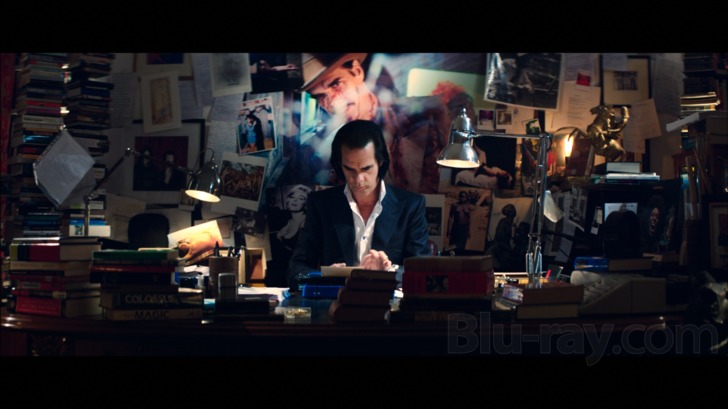
20,000 Days uses the format of a conventional "day in the life" to convey a sense of Cave's artistic biography up to this point. It's not so much about a philosophy (a term Cave would no doubt find both pretentious and constraining) as an attitude, an openness to discovery and a willingness to explore. Cave begins the day arising from the bed he shares with his wife, Susie, in their home in Brighton, England, a location that prompts several poetic ruminations in voiceover about its extreme weather, its geography and its inexplicable appeal to a native son of Australia. Cave then spends several hours writing on a manual typewriter, describing (again in voiceover) the appeal of the imaginary world into which he disappears while sitting in his study surrounded by books, notes and pictures. (It takes nothing away from this scene when we learn, in the short documentary included in the extras, that the study was a set constructed for the film, because it feels like the kind of place where the man we meet in the film would want to sit and write.) The rest of the day is taken up with various meetings and appointments, of which an assistant helpfully reminds Cave via messages on an ancient answering machine that records on tape cassette (like the manual typewriter, a deliberately retro touch). Cave meets with an interviewer, played by psychoanalyst Darian Leader, who talks to him about his childhood and its influence on his work. He visits Bad Seed member and frequent collaborator Warren Ellis, and they share a meal and reminisce. He visits a personal collection of memorabilia, where archivists dutifully cataloguing his photographs, notes and journals ask him to identify himself in childhood photos, to provide context for various pictures from his early career and to interpret cryptic marginalia from song lyrics, journals and books he once read. As both Cave and his directors readily admit, these encounters were all staged to give a narrative shape to 20,000 Days, but the dialogue that grew out of them was spontaneous. For example, the archive sequence was shot over several days, and as Cave pores over long-forgotten items, he forgets about the cameras and begins thinking aloud about the eras captured in letters, photos, even an early "Last Will and Testament" that he now finds an amusing relic of youth. His conversation with Leader lets him summon up memories that continue to inspire him, like his father reading him Lolita and explaining why Nabokov's style was great writing. But Forsyth and Pollard don't just construct an artifical "day in the life" from their footage. They repeatedly interrupt the day's forward motion with scenes from other times and other places, as Cave writes songs, rehearses with the Bad Seeds, makes recordings in various venues and performs before crowds. Are these memories of past events or the anticipation of future ones? It's impossible to say. They are all part of the restless motion of a mind that cannot remain idle. Even driving from place to place alone in his car, Cave conjures up passengers to talk to. He discusses the challenges of performance with friend and actor Ray Winstone; asks former Bad Seed Blixa Bargeld why he left the band; and catches up with pop star Kylie Minogue, who briefly boosted the Bad Seeds' public profile by recording one of their songs. All three individuals agreed to appear in 20,000 Days for unscripted conversations, but they play their parts so well (and are so capably edited) that, in the finished product, they become creatures of Nick Cave's imagination. The sensation conveyed by 20,000 Days is of Cave's life as one endless artistic project that can never be completed, only continued, and that embraces every medium in which he works. He doesn't know what it means or where it's going, because, as he says about songs, you have to play them in order to understand them. Some of the most striking moments in the film are also the most personal. In one, Cave recalls the first time he saw his wife Susie, when every feeling of attraction he'd ever had to any woman, real or imaginary, seemed to unite and focus; Forsyth and Pollard accompany Cave's outpouring of words with a rapid montage of images that are surely one of the strangest, if most heartfelt, tributes to a spouse ever assembled. In another feat of cross-cutting, Forsyth and Pollard show Cave performing today, with rapid cuts to his earlier self, as if to say that every one of his performances carries within it all the ones that went before it. For Cave, who believes that experience doesn't mean anything until it is interpreted through memory and imagination, it is an especially fitting approach.
20,000 Days on Earth Blu-ray Movie, Video Quality 

According to IMDb, 20,000 Days on Earth was shot with the Arri Alexa, which is consistent with the film's appearance on Drafthouse Films' 1080p AVC-encoded Blu-ray. The credited cinematographer is Erik Wilson (Submarine, The Double). Perhaps as a counterpoint to the rough features and haunted eyes of the film's subject, the directors and cinematographer have opted for rich colors and a beautiful, smooth surface wherever possible. The image on Drafthouse's disc is as good as they come, sharp and clear without any digital edginess, free of noise or artifacts, and moving easily between the deep blacks of the nighttime closing shot on the beach at Brighton and the pastoral daytime scenes in the English countryside, along with everything in between. Fine detail is evident in Cave's distinctive wardrobe, in the stacks of books and photos on his desk, in the tiny handwriting that is legible in his archive, and in dozens of other small touches. 20,000 days is a tribute to the possibilities of digital photography. (For obvious reasons, footage taken from archival sources looks only as good as the original material will allow.) Although the film is only 98 minutes long, Drafthouse has placed it on a BD-50, allowing for an average bitrate of 30.98 Mbps. Most studios would have tried for much tighter compression, especially with digitally originated material. There is no way to be sure without access to the original uncompressed master, but perhaps the extra bandwidth is one of the reasons the Blu-ray looks so good.
20,000 Days on Earth Blu-ray Movie, Audio Quality 
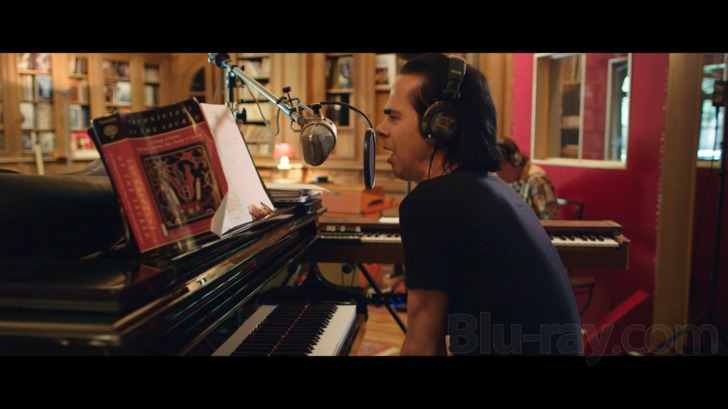
Like the film itself, the 5.1 soundtrack for 20,000 Days, presented in lossless DTS-HD MA, is something of a collage. It incorporates dialogue, voiceover, sound effects, pre-recorded music and live music—all of which have been carefully mixed to give an impression of casual spontaneity, while the reality is obviously the opposite. Listen, for example, to the way that Cave's voice hands off the soundtrack to the ocean waves at the film's conclusion. It's a lovely effect, but it's not one that just happened naturally. Or notice the careful sound editing that takes portions from different parts of conversations and makes them seem to flow naturally as a single encounter, or the way an environment fades to silence before the editing switches abruptly to another location. Memory flows this way naturally, but sound editors have to work at it. Nick Cave and Warren Ellis wrote all of the film's music. Who else?
20,000 Days on Earth Blu-ray Movie, Special Features and Extras 
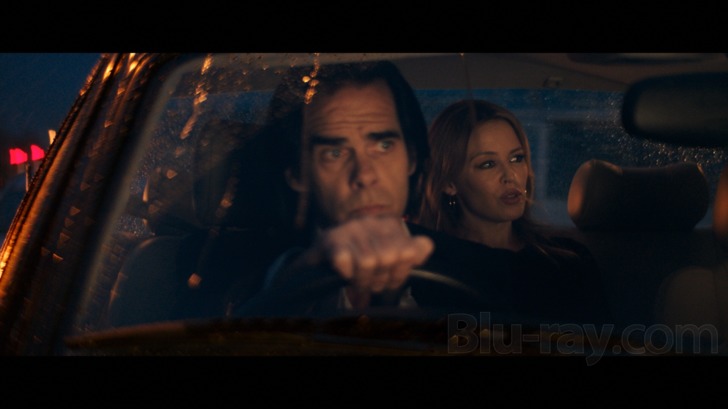
- The Making of 20,000 Days on Earth (1080p; 2.00:1; 15:29): Cave, Forsyth, Pollard and producer James Wilson discuss the origin of the film and their approach to making it. Pollard describes it best when she says that they decided what to make by first deciding what they did not what to make. Behind-the-scenes footage is included from the sessions at the "archive" (which doesn't really exist) and from the car conversations, which Pollard says were especially challenging to film, due to the logistics.
- Outtakes (1080p; 2;40:1; 34:20): Many of these scenes are remarkable, but it's easy to see how they either would have thrown off the pacing or, in the case of items like the duet with Kylie Minogue or the interview segment about Blixa Bargeld, would have undercut the sense of mystery that attends these shadows of memory when they appear in Cave's car.
- Demo Sessions: See That Girl
- The Interview: Spasmodic Tall
- Studio: Backing Vocals
- The Interview: Blixa Bargeld
- Studio: Jubilee Street Violin
- The Interview: Other Worlds
- Ray Drive: Fish & Chips
- The Archive: Mother
- Rehearsals: Your Funeral . . . My Trial
- The Archive: Lists & Words
- Rehearsals: Stranger Than Words
- The Archive: Bronze Statue
- Live at Koko: Duet with Kylie Minogue
- Trailers (1080p)
- Theatrical Trailer
- A Band Called Death
- Borgman
- The Overnighters
- Booklet: As is their usual custom, Drafthouse has included a printed booklet. This one contains separate interviews with the directors and Cave, a few pages of thumbnails of frames from the film, several large behind-the-scenes photos, and film and disc credits.
20,000 Days on Earth Blu-ray Movie, Overall Score and Recommendation 
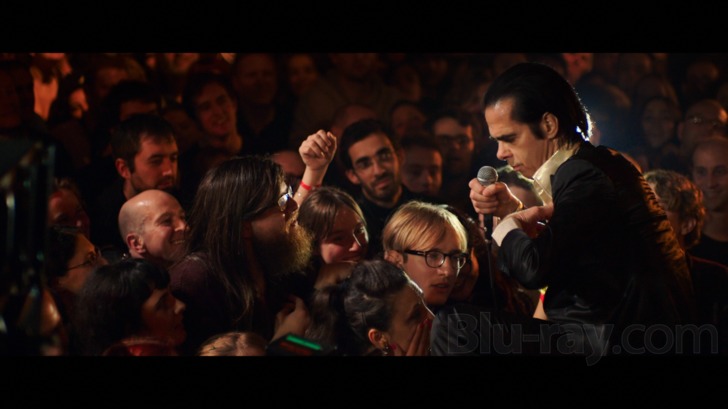
Any fan of Nick Cave and the Bad Seeds should see 20,000 Days on Earth simply because it offers such an intimate and unusual perspective on this distinctive talent. For anyone unfamiliar with Cave, this is a good way to make his acquaintance, because directors Forsyth and Pollard have turned the occasion itself into a compelling artistic experience, filled with interesting sights and sounds and an overall sense of the mysterious and unknowable forces that shape the lives not just of artists, but of everyone. Drafthouse has done their usual commendable job in producing a technically superior presentation. Highly recommended.
Other editions
20,000 Days on Earth: Other Editions
Similar titles
Similar titles you might also like

One More Time with Feeling
2016

Searching for Sugar Man
2012

The Rocket
2013

Mystify: Michael Hutchence
2019

Katy Perry: Part of Me 3D
2012

U2: From The Sky Down
2011

We Are X
2016

Whitney
2018

Moonage Daydream 4K
2022

Thirty Two Short Films About Glenn Gould
1993

The Decline of Western Civilization
1981

A Poem Is a Naked Person
1974

No Direction Home: Bob Dylan
Deluxe 10th Anniversary Edition
2005

Vox Lux
2018

Buena Vista Social Club
1999

Jazz on a Summer's Day
1959

Pavarotti
2019

Oasis: Supersonic
2016

Marley
with Bonus Disc
2012

Gimme Shelter
Uncensored 30th Anniversary Version
1970
